HexCon20 as it happens: Live updates
Click for live updates of HexCon20 Events

Get fresh insights, pro tips, and thought starters–only the best of posts for you.
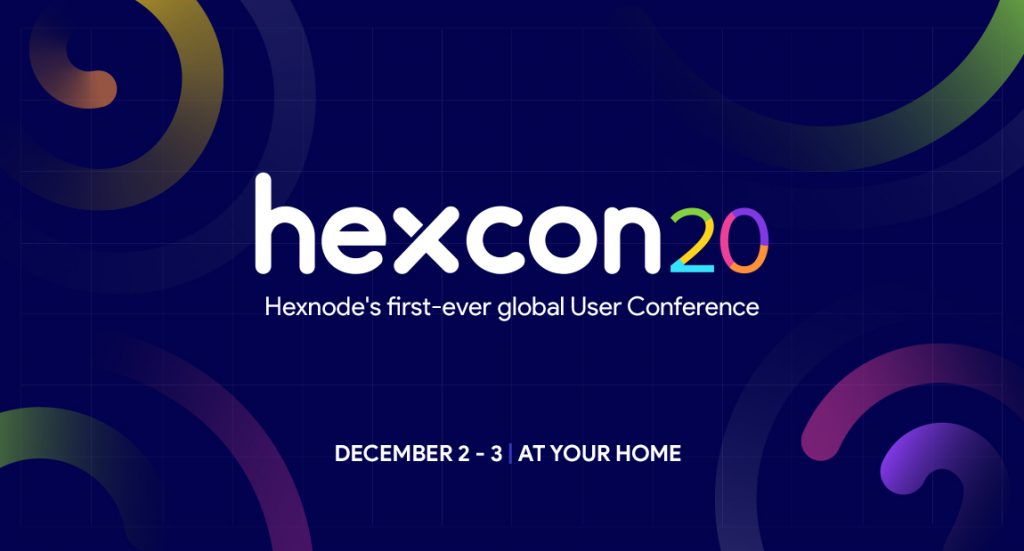
The first ever Hexnode User Conference HexCon 2020 kicked off to a great start today, thanks to the active participation from each one of you. With trending breakout sessions designed to contribute to your repertoire of device management, live demos and exciting games, Day 1 had something for every single participant.
Here’s what happened today:
Apu Pavithran, founder and CEO of Hexnode, welcomed everyone to HexCon20. He highlighted how Hexnode stayed strong even in the face of a global pandemic and helped in the smooth transition to remote work for the organizations. Our valued customers shared insights on how they were able to use Hexnode to ensure seamless management of devices even in these trying times.
Exciting new features were unveiled, including a complete new look of Hexnode MDM, Hexnode Do, Hexnode Academy and Hexnode Connect.
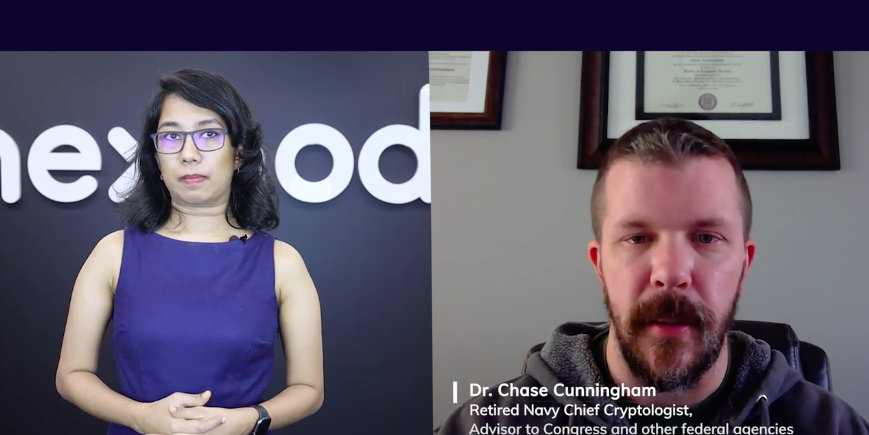
In this very informative talk session, Dr. Chase Cunningham, aka Dr. Zero Trust, discussed with our Chief Marketing Officer, Rachana Vijayan, about the evolution of Zero Trust and how it impacts the future of enterprise security. He talked about how segmentation isolated in a controlled and granular level reduces the attack vector. While you can never be sure of being completely safe from attacks, the goal is to be better than the next weak target. 27 percent of the global workforce is predicted to never return to the workplace. To keep up with the demands of more cloud, more remote and more mobile technology for enterprises, Zero Trust strategic approach plays an important role.
When asked about organizations planning to start their Zero Trust journey, Dr Chase was asked on where these organizations should focus their early efforts on. His answer to this was to:
Next the challenges that organizations face in getting IAM right were discussed. Dr Chase’s answer to this was for enterprises to really look at the problem and limit the adversary’s control when they get into the network. Once businesses do that, they’ll be able to achieve a more granular level of segmentation and have a better control on what goes on inside the infrastructure.
SMB’s have always had a hard time to successfully implement ZT within their organization, this shouldn’t be as hard as it sounds as a proper strategy for SMB’s was given. They should look at enterprises that successfully implement ZT and ask how they can leverage that same approach to ZT but by making it more specific for them. SMB’s often have the misconception that they won’t be targeted but cybercriminals often go for easy targets so they should always be prepared to boost up their security and fend any attacks in the future.
Organizations that are already invested well in cybersecurity while adapting ZT should have a more business aligned strategy that helps them do better. Dr Chase talked about how statistics show that when enterprises follow a strategy they are able to generate more revenue and have happier employees.
With the evolution of the device management industry in the past few decades, security has also become more mature, questions were asked whether ZT will be at the center of UEM in the future. Dr Chase’s take on this was:
Next Dr Chase gave us an insight on how organizations should go for security approaches that are simplistic in nature and does not negatively impact the user experience. When asked about how quickly organizations can get to a ZT state, it was noted that it would depend on the capabilities that organizations use to solve the security related issues. Organizations should further understand the key difference between vendor solutions and vendors that understand what ZT looks like and the core components that are necessary.
Transition to remote work has not been easy, in the light of the current of the current situation, it was discussed how important ZT will be in helping businesses keep their employees and confidential data safe while working remotely. The session concluded with Dr Chase highlighting the importance of the adaption of zero trust across other industries.
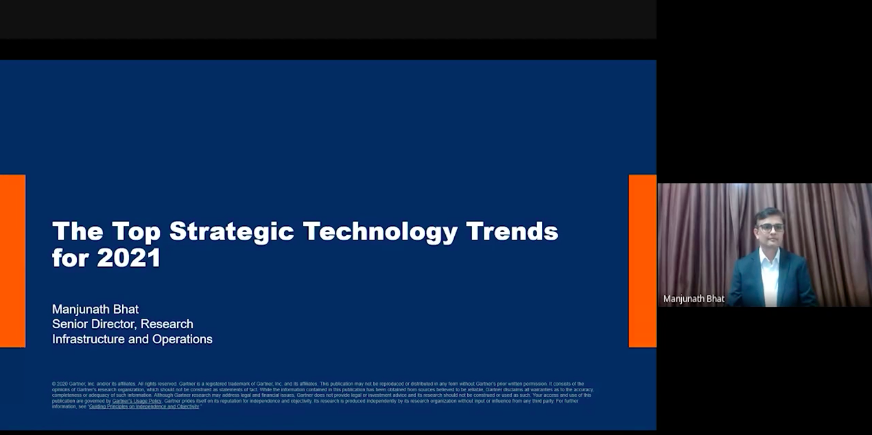
Next up, we heard from Gartner Analyst, Manjunath Bhat, about the top strategic technology trends for 2021. The trends can be classified into three themes:
He also discussed Modern Endpoint Management principles for efficiently securing remote mobile devices.
Security should not come at the cost of user experience. Using appropriate Digital Marketing Experience Tools would help the admin to monitor the end-user experience in an effective manner.
The people centric theme highlighted the way in which technology affected stakeholders across the entire business ecosystem. In order to give us a better picture of how important this theme was, Manjunath Bhat, walked us through the benefits that IoB, total experience and privacy enhancement computation gave to businesses to enhance their customer experience. Next, we got to hear more on location independence which allowed organizations to smoothly operate their business from anywhere. The last theme which was resilient delivery dealt with the use of AI and hyper automation to enable businesses to adapt clusticity. It was also brought to light that machines will play key role in making decisions in the future with the help of its enhanced capability to collect data and various other insights.
The second half of the presentation touched upon the theme of the future of endpoint operations, where the need for enterprises to bring a change to their current technological strategies to meet their business needs were discussed. The COVID19 pandemic has brought to light the importance of adapting an Anywhere Enterprise operational strategy. Manjunath Bhat shared with us an interesting statistic which showed that people’s expectation of working remotely increased after pandemic. He further went on to say that this trend will keep on increasing regardless of the pandemic.
In order to ensure a smooth workflow and secure work environment, we were given a detailed insight on the four remote work technologies that businesses needed to implement, these included:
When talking about modern endpoint management, its core principles such as the enablement mindset, continuous engineering approach and the consolidation of teams were discussed in much detail.
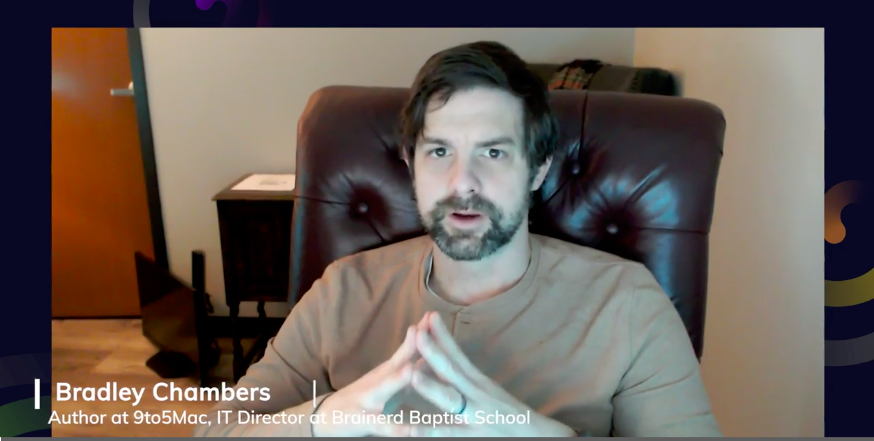
Bradley Chambers, an author at 9to5Mac, discussed everything we need to know about managing Apple devices for teams that fully remote. The topics discussed were:
The risks that Shadow IT posed on organizations were discussed. The challenges of taking up remote IT were talked about, in order to make this easier, businesses were asked to think about their application strategy. The three things that admins have to implement were device security, user authentication and IP check. In order to safeguard the company’s resources while working remote, businesses were made aware of the importance to enforce zero trust security measures and put in a level of control to ensure a smooth workflow.
The talk on device deployment covered its configuration, management and the ease with which it could be easily set up for the users. The benefits of using an MDM for easier device deployment were also discussed. One of the key highlights of this session was empowering users to support themselves. Not all businesses can afford to have an IT service available at all times, in such situations it’s better to keep users aware of what the pitfalls are and have them updated on the initial steps of the troubleshooting process. Well-developed help documents would make this a lot easier.
Next the challenges of deploying non mac applications were discussed, Bradely Chambers gave a detailed guide on how to make this more manageable. With everything going remote, it’s harder for IT admins to troubleshoot any issues that the users might be facing at the time, with the help of remote access tools, they can see exactly what the user is seeing and easily fix the glitches right away. Remote access will also come handy in situations if you need to remove a malicious malware from the system.
The benefits and drawbacks of deploying OS updates were discussed. It was recommended to have a time machine backup so that users won’t lose any important work that they are working on. Lastly, the nuances of device repairs, employee onboarding, employee offboarding and device offboarding were discussed.
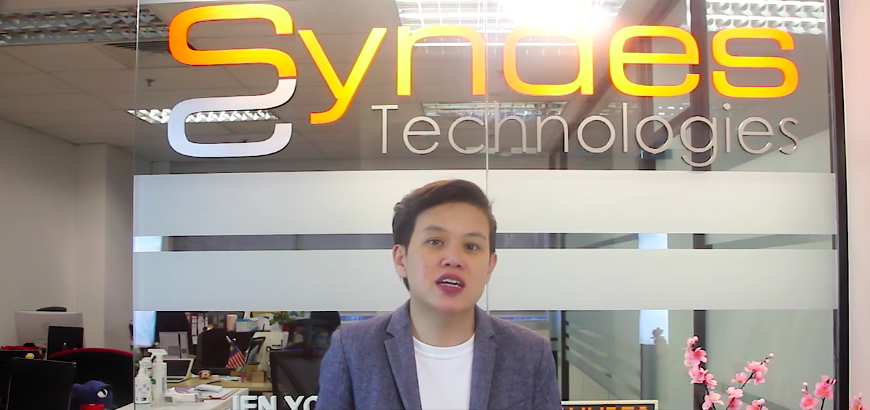
Jen Yong, founder and CEO of SYNDES Technologies Sdn Bhd, provided insights on how centralized management and real-time insights of connected and integrated devices (IoT) helps to expand the scope of the industry. Jen commented that due to the new normal situation prevailing all over the world amid COVID’19, businesses are more likely to invest in digital technologies which will create a huge impact on IoT adoption and pave the way for a true digital paradigm shift. He added that the successful digitalization approach is to use the design process to carry out in-depth strategy research, pinpoint actual efficiency needs, and find opportunities to invent.
Throwing light on the role of endpoint management platforms in securing Workplace IoT, Jen mentioned that the proliferation of connected devices into the workplace is urging the industries to find more ways to manage and maintain these devices. This is where device management platforms have their relevance.
Device management platforms simplify IoT management by:
Later, Jen focused on the key features of IoT management for enterprises which included:
He also emphasized the increasing demand for cloud platforms in the market as user centric cloud platforms helps in scaling up resources to meet the increased level of data and devices. Access to real-time data and remote monitoring offers accurate predictive maintenance for industries such as manufacturing, healthcare, automotive, and more. Jen Yong concluded that owing to the global pandemic, businesses are at the right track of new technological approaches for development, production, and management. He predicts Enterprise IoT management to be the next ecosystem in the new normal industry.
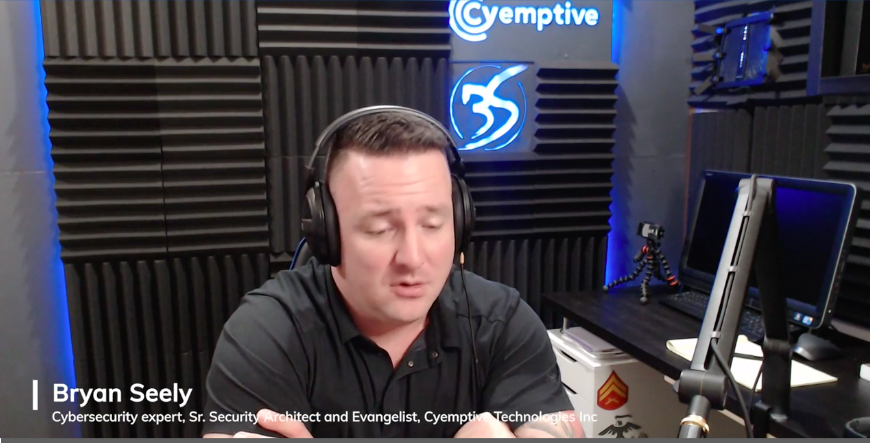
In this session, Bryan Seely, Cybersecurity expert and Sr. Security Architect and Evangelist at Cyemptive Technologies Inc., gave an interesting talk on Social Engineering, replete with personal anecdotes and experiences. Social Engineering is psychologically manipulating users into divulging sensitive information. Bryan’s stories get us thinking, on the edge of our seat and hankering for more.
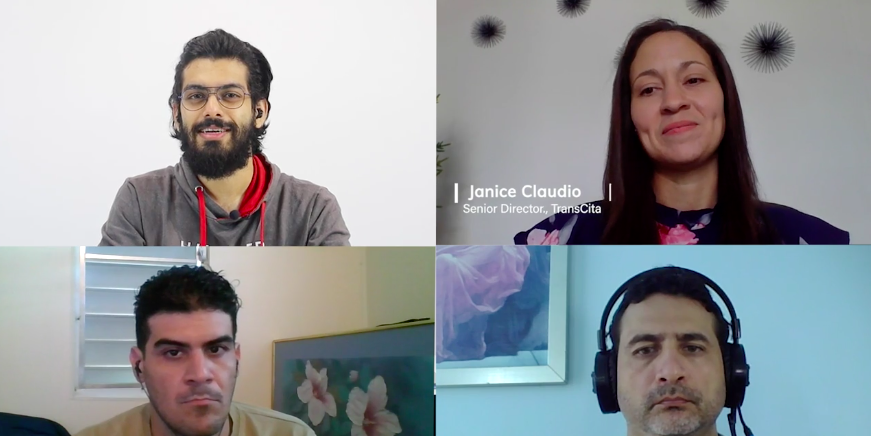
During this talk hosted by Amith, Senior Product Evangelist at Hexnode, a team from TranCita shared their real experience on dealing with the challenges brought by the COVID’19 pandemic. We heard from actual industry experts how they coped with the unprecedented spikes in growth during the pandemic with the help of Hexnode MDM. Janice Claudia, the Senior Director of Technology Business Intelligence and Service Separations at TransCita, said a bit about the services provided by their company TranCita, the pioneer non-emergency transportation service provider in Puerto Rico. She shared how their company is using Hexnode to manage their 500 iPads deployed across the island. They are using Hexnode mostly to:
Janice shared the problems TrasCita is facing during the COVID’19. She recalled how pandemic initially affected their operations efficiency and service quality levels. They had offerings for medical clients, so they had to keep their operations going even when the pandemic hit Puerto Rico. She added that the team had to address many challenges regarding provisions to better manage their calls, coordinate high volumes of service demands with a short period of time, finding more ways to automate assignments, engage more with business partners, use data to make better decisions and Hexnode was their key tool in addressing many of these demands.
Omar Mari, IT manager at TranCita, who was also involved in setting up the infrastructure needed to handle all the new services, shared everything was handled. He also added that the major challenge was that they need to move over 100 employees remotely within a week and faced some telecommunication problems, and had to make VPNs for network security.
Edwood Ocasio, Senior Software Developer for Transcita, talked about how Hexnode helped them overcome the challenges posed by the growth spike in the pandemic. He cited some examples of the problems they have faced. Due to the dramatic increase in transportation that led them build a network of partners, they need to share data to and from the partners. To achieve this, they build a web application, through which the partners can seek information of the dedicated trip and assign their own drivers. Another challenge was they need provisions to ensure faster communication with the drivers. The team acknowledged that they were able to boldly deal with most of these challenges with utter dedication and determination and with the assistance of tools like Hexnode MDM.
There was a whole lot of fun during the networking breaks with some interesting networking sessions and virtual contests.
This was a fun game where teams had a hilarious time trying to find out who the imposter was within their team. The winning team members received 50 points each from the leader board.
In this virtual game of Pictionary, the participants were split into two teams. The game was held live on the video call on the Pictionary room in the room section at hexcon20. The participants joined the rooms and raised their hands to participate.
Participants were asked to click a selfie with the Hexnode screen and share it on the wall and on their social media with the hashtag #hexcon20
The virtual scavenger hunt had 10 participants and was hosted live over video calls in the Scavenger Hunt Room in the Room Sections @ Hexcon20. The winner receivied a 100 points from the leaderboard.
Missed Day 1?
No worries. Gear up and stay tuned for the second round of exploring exciting and innovative breakout sessions, demos, discussions, games and more at HexCon20.